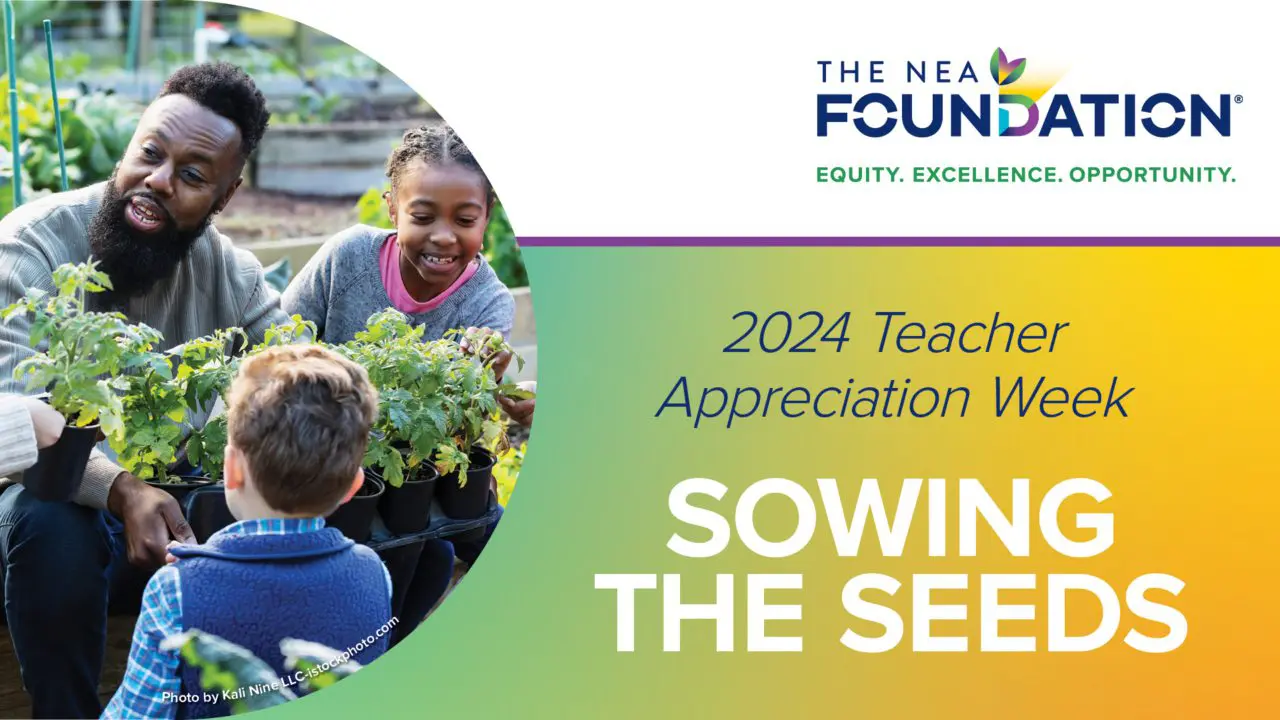In the heart of the Mississippi Delta region sits the small town of Marks, Mississippi. The county seat of Quitman County, Marks is home to only around 1,500 residents. In 1968, Dr. Martin Luther King Jr. visited Marks, where the poverty he witnessed caused him to weep. He spoke at the National Cathedral in Washington, D.C. shortly after his visit, declaring: “I was in Marks, Mississippi, the other day, which is in Quitman County, the poorest county in the United States. And I tell you I saw hundreds of black boys and black girls walking the streets with no shoes to wear.”
Dr. King envisioned a mule train traveling from Marks to Washington, D.C. to raise awareness about the poverty plaguing Black communities across the country, but was assassinated before his vision could become a reality. Marks residents carried out the mule train after Dr. King’s assassination. The mass mobilization became known as the Poor People’s Campaign, and ultimately led to federally-funded free and reduced school lunch programs.
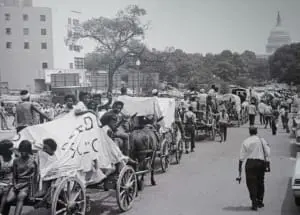
A mule train of residents of Marks, Miss. arrives in Washington, D.C. in 1968 to raise awareness about poverty
Despite this, and although more than 50 years have passed since Dr. King’s visit, some aspects of life in Marks seem to have hardly changed.
Today, Marks consists of single-track roads lined with small houses built on pier foundations to protect from flooding, many appearing uninhabited. Abandoned storefronts seem to outnumber operating businesses. The community of Marks is served by the Quitman County School District, which is comprised of a single elementary school, middle school, and high school.

A road in Marks, Mississippi
“The people who live here have been here for generations,” said Robert L. Jackson, former Mississippi state senator and CEO of the Quitman County Development Organization. “They’re descendants of sharecroppers. Many of them didn’t get the chance to go to college or find something that pays more than minimum wage.”
Jackson hopes that things can be better for the younger generations, who might find a more accessible pathway to higher education and opportunity. He has spent nearly four decades serving as CEO of the Quitman County Development Organization, which works on local issues like housing and education to address the needs of Quitman County residents.

The Rev. Carl Brown Education Center in Marks, Miss.
Nearly one third of Quitman County’s population lives in poverty, and the average household earns just $32,000 per year. One third of residents don’t have broadband internet at home. Only 15 percent of residents age 25 and over have a bachelor’s degree[1].
The NEA Foundation partnered with the Quitman County Development Organization in 2023 as part of its Community Schools Initiative. The initiative supports the development of community schools in the Deep South, one of the most under-resourced regions in the country. The community schools model uses schools as resource hubs for the community, connecting students, parents, and families with essential resources like food, clothing, healthcare, academic enrichment, and career counseling.
Superintendent of the Quitman County School District Walter Atkins, Jr. attended the public schools in the district as a child. He remembers when the school district was comprised of seven or eight schools throughout the county as opposed to the three schools that make up the district today. But population decline resulted in numerous school closures.
“People move where the jobs are,” Atkins said.

Superintendent of the Quitman County School District Walter Atkins, Jr.
In spite of the relatively few economic opportunities and small population, both Atkins and Jackson have pride in Quitman County. Both were born and raised in Quitman County and have dedicated their careers to serving their local communities. And both are proponents of the community schools model as a means of addressing the academic and non-academic needs of children and families in Quitman County.
For Atkins, returning to the district has allowed him to consider ways of addressing inequities and resource gaps he experienced firsthand as a student. He advocates for creating a unified vision among organizations to improve opportunity in Quitman County.
“Let’s join forces and stop working in isolation,” Atkins said.
A new Service Partnership Agreement between the Quitman County Development Organization and Coahoma Community College aims to do just that. Coahoma Community College is one of Mississippi’s eight Historically Black Colleges and Universities (HBCUs), and serves many of the students of Quitman County who wish to continue their studies beyond secondary school. Through the new partnership agreement, the two organizations will join forces to expand opportunities for students, teachers, and families in Quitman County. The new efforts will include free dual enrollment opportunities for Quitman County students, allowing them to complete college credits while in high school. Dual enrollment not only gives students who wish to continue their studies an academic head start, but also minimizes their risk of acquiring burdensome student debt. Additionally, staff and faculty at the college will work with parents who would like to obtain their GED, expanding their career and learning opportunities. Current undergraduate students at Coahoma Community College will offer tutoring to students at the high school. And students who don’t see themselves continuing into higher education will have opportunities to connect with mentors who teach real-world skills and trades, such as cosmetology, welding, and barbering.
“This partnership will connect students to role models, and ensure they can succeed not only in school, but in life,” said Sara A. Sneed, president and CEO of The NEA Foundation, which helped formalize the new agreement. “I want to encourage other HBCUs and universities around the country to embark on similar partnerships.”
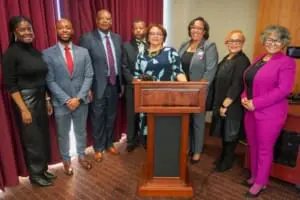
From left to right: NEA Foundation Vice President of Programs Ebony English; NEA Foundation Vice President of Policy and Communications Reginald Ballard; former Mississippi Senator and CEO of the Quitman County Development Organization Robert L. Jackson; Superintendent of the Quitman County School District Walter Atkins, Jr.; NEA Foundation President and CEO Sara A. Sneed; Clarksdale Municipal School District Superintendent Dr. Toya Harrold-Matthews; Director of Student Engagement at Coahoma Community College Karen Woods-Done; and Personnel Director at City of Clarksdale Tarra Slack
Ready for Change from Marks to Clarksdale
Less than 20 miles to the west of Marks is Clarksdale, the county seat of Coahoma County, Mississippi. With a population of around 20,000, Clarksdale is known as the birthplace of the Mississippi Delta blues, and attracts music fans from around the country visiting the famous “Blues Crossroads” or seeing live music in one of the blues clubs. But in spite of its rich history and culture, Clarksdale residents struggle with limited economic opportunity much like residents of Marks do. The median household income in Coahoma County is around $36,000. About a third of the residents live below the poverty line, including those under 18 years of age[2].
The educators and administrators at Booker T. Washington Elementary School in Clarksdale have an intimate understanding of the community’s needs, not only because they can observe the needs of students, but because they’ve lived it themselves.
Principal of Booker T. Washington Elementary School Bridney Skipper-Johnson was a student at the school when she was a child. “I met my first best friend here,” said Skipper-Johnson. “In third grade, I couldn’t see the board at all. A friend sat next to me and we would share eyeglasses. Those issues still exist today.”
Skipper-Johnson explained that she learned in January—midway through the school year—that one of the students at the school is blind in one eye. At the time, the student had no corrective lenses.
“I took him to the doctor myself and now he has glasses, but I think about how long he didn’t have them,” said Skipper-Johnson. “If we had a clinic at the school, he would have been able to get them sooner.”
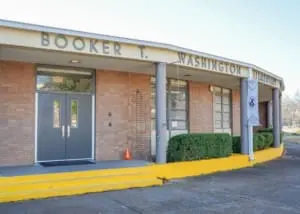
Booker T. Washington Elementary School in Clarksdale, Miss.
The NEA Foundation is working with the Clarksdale Municipal School District to bring the community schools model to Clarksdale, and administrators at Booker T. Washington Elementary School believe the school and its community is up for the challenge.
“This is one of the oldest schools in the community,” said Dr. Toya Harrold-Matthews, superintendent of the Clarksdale Municipal School District. “We want to make sure it’s a statue of hope, a place of learning, and something the community can be proud of. We want to take it to the next level. The times are calling for us to do something different.”
Josephine Rhymes, a retired educator who now works with the district as a community advocate, explained the importance of including the wider community in the development of Booker T. Washington Elementary as a community school.
“In a community school, everybody has an opportunity to participate,” Rhymes said. “We brought a number of potential community partners to a meeting and explained what community schools would do for the community. We had instant buy-in—we had the hospital, the mayor, financial institutions. Next we’re going to have a similar meeting with parents. We want to make sure they feel heard and find out what their needs are. We want to make sure that when we start these initiatives at the school, they won’t feel like ‘It’s not for me.’”
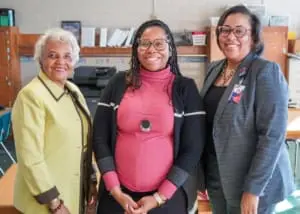
From left to right: Community Advocate Josephine Rhymes, Booker T. Washington Elementary School Principal Bridney Skipper-Johnson, and Clarksdale Municipal School District Superintendent Dr. Toya Harrold-Matthews
The Essential Ingredient of Community Pride
Over time, and with enough supports, the Mississippi Delta can become a place of greater opportunity. In 2018, after decades of work by civic leaders in Quitman County, an Amtrak station opened in Marks. Consisting of a single outdoor platform, it’s the first passenger train station the town of Marks has ever had, and represents a bridge to the greater world for Marks residents. Quitman County Administrator Velma Benson-Wilson described the Amtrak station as “a beacon of light” bringing hope to the community. Longtime Marks residents are known to greet passengers arriving by train with coffee or cookies.
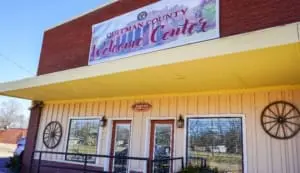
The Quitman County Welcome Center
In 2021, the community opened the Quitman County Welcome Center, which doubles as an Amtrak waiting room, highlighting the rich historical legacy of the area. Photos of civil rights leaders, famous musicians, and entrepreneurs hailing from Quitman County line the walls alongside descriptions of Dr. Martin Luther King Jr.’s Poor People’s Campaign. Postcards featuring artwork depicting downtown Marks, which is comprised of a single block of storefronts, are offered for a dollar each. In spite of all of its hardship, the pride in this small community is palpable.

A record player in the Quitman County Welcome Center plays an album by country music legend Charley Pride, who was born and raised in Quitman County
The ingredient of community pride may matter even more than money when it comes to advancing opportunity in the Mississippi Delta. Principal Johnson of Clarksdale described the empowering nature of the community schools model as key to its success.
“The thing about community schools is it’s not just somebody coming in from the outside and saying, ‘You seem needy, let me drop some money,’ and then they go away. It’s empowering the community, the people who are there. It’s saying, ‘You can do this and you just need a little nudge.’”
“We’re not afraid of doing things in a different way,” said Superintendent Harrold-Matthews. “If we expect this community to thrive and survive, we have to do something different. And we’re ready for that.”
[1] U.S. Census Bureau. “QuickFacts: Quitman County, Mississippi.” United States Census Bureau, https://www.census.gov/quickfacts/fact/table/quitmancountymississippi/AFN120217. Accessed Feb. 3, 2025.
[2] U.S. Census Bureau. “QuickFacts: Coahoma County, Mississippi.” United States Census Bureau, https://www.census.gov/quickfacts/fact/table/coahomacountymississippi/PST045224. Accessed Feb. 3, 2025.
















